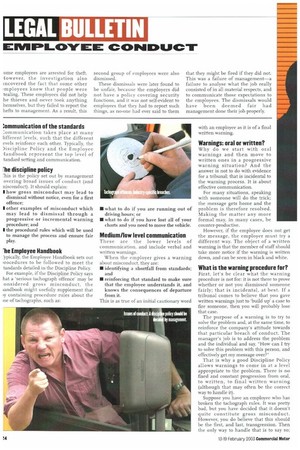Ain't just misbehavin but is it misconduct.
Page 23

Page 24

If you've noticed an error in this article please click here to report it so we can fix it.
Conduct and misconduct: What is it?
Misconduct is an issue of behaviour; it is about what the employee did, or omitted to do. This is in contrast to lack of capability (which is about the employee's lack of skill), aptitude, or some other physical or mental characteristic which means they are not able to do their job properly.
Sometimes these elements are mixed together, creating a mix of 'can do and won't do': the employee cannot do certain things properly despite trying, and simply won't do other tasks of which he is perfectly capable.
It is therefore important for an employer to implement and enforce a well-defined set of behavioural rules.
When employers have problems in an employment tribunal, the failures are most often centred on:
• having policies and rules but not properly communicating them to employees; or • failing to have a policy or rule but expecting the employee to act as if that rule were in place anyway.
Those criticisms are much more commonplace than criticism for having an 'unreasonable rule; that is rare, because it is not the position of a tribunal to manage your business and challenge how you run it, as long as you have sought to run it in a fair and effective manner.
Let us take the example of a warehousing operation. The warehouse is full of valuable domestic electrical products, and the employer calls in the police because of stealing. As a consequence,
ome employees are arrested for theft. -Iowever, the investigation also zncovered the fact that some other ,mployees knew that people were tealing. These employees did not help he thieves and never took anything hernselves, but they failed to report the hefts to management. As a result, this
second group of employees were also dismissed.
These dismissals were later found to be unfair, because the employers did not have a policy covering security functions, and it was not self-evident to employees that they had to report such things, as no-one had ever said to them that they might be fired if they did not. This was a failure of management—a failure to analyse what the job really consisted of in all material respects, and to communicate those expectations to the employees. The dismissals would have been deemed fair had management done their job properly.




































































































































































